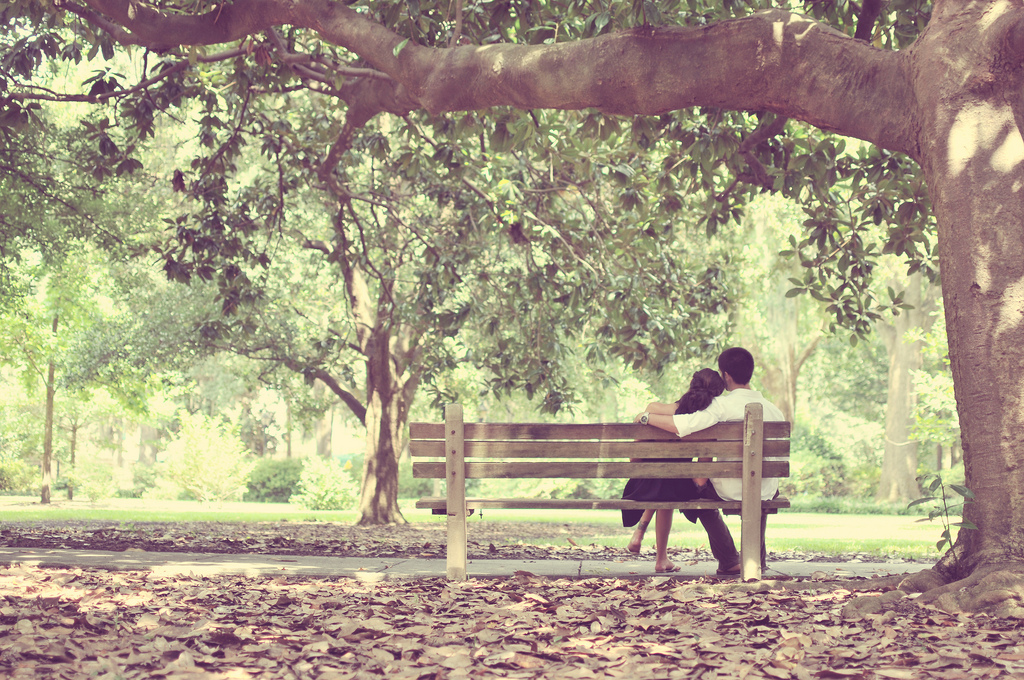I used to have a belief about love.
When I’d fall in love, I’d have trouble imagining anything could ever go wrong, but as soon as we’d have our first glimpse of a problem, my belief would catch up with me and remind me of love’s inevitable undoing. You see, I believed that love started out good but always got bad. I believed that while budding love was fun and exciting, it was doomed to fade, and that all love naturally devolved into pain, obligation and resentment. But I clearly remember that I didn’t see this as a belief at the time.
No…I saw it as “just the way things are.”
And since that was how things were, it never occurred to me that if I did things differently, my relationships might change too. I didn’t know that if I became more skillful in relationships, love could evolve rather than devolve.
But now I have a new belief. I believe that it’s up to us whether our relationships evolve or devolve. I’ve heard it said that the internal universe is as vast as the external universe. I believe (and I’ve experienced) that, if we’re willing to explore it, relationships open us up and guide us through that internal universe better than anything. Although many people will sadly never use relationships in this way, for some, love is a compelling enough force to get us to confront ourselves in ways we otherwise wouldn’t.
The reward of love is a compelling enough incentive for us to withstand the pain of growth. And for those who stick with it long enough to get the lessons, before long, the growth becomes it’s own reward.
And if we’re using our love well—that is, if we’re using it to grow and heal each other, if we’re keeping the space between us clear of resentments, if we’re looking beneath our own crap when we get stuck, and we’re letting love make us better people—relationship continue until they no longer fit us. And then, instead of ending, they often just change form from lovers to friends.
On the other hand, if the relationship in it’s current form manages to keep growing us, if we still have more to learn from each other as the years go on, maybe the end never comes. Maybe our relationship never changes form dramatically, but rather it evolves subtly to keep up with us our entire lives.
Really, the only part that’s up to us is that we do relationships well…that we do them really, really well. Because if we become masterful at being in a relationships, if we grow our relationship skills and we use them well and still a point comes when we can feel the relationship is supposed to change form, then it will change and the change will not feel wrong.
The trouble for most people is the business of doing it really well. We are generally not given much quality guidance on how to do it well and most of us don’t have great examples to learn from. And in fact, we’re overtly taught a lot of ways to do it poorly because most people around us are equally as mislead.
I’ve learned so much working with myself and with my clients that I could spend the rest of my life cataloging rules we need to throw out, beliefs that aren’t serving us, gender conditioning that causes misunderstanding between couples, fear and shame we have about ourselves that, unchecked, keep us disconnected and make true intimacy impossible.
All that and I still wouldn’t scratch the surface of what there is to discover about relationships. The opportunity for discovery and growth here is endless.
I could spend another lifetime writing a how-to guide on what to do instead…but my suggestion is that everyone move beyond just reading books and articles on relationships and hoping that understanding will change us. I suggest that we go beyond trying to understand it intellectually and actually start doing things differently in our relationships. I mean start doing those really uncomfortable things we know deep down we should do. My hope for everyone is that we start messing up and learning from our mistakes, that we begin taking real risks, getting vulnerable, and investing in each relationship as though our spiritual awakening depends on it…because it does.
Let’s just acknowledge that we have been half-assing this part of our lives, not because it isn’t crucial to our fulfillment and happiness, but because it’s so big and seemingly so complicated. We haven’t given it everything because, with our limited acumen, we feel so ineffective and powerless in the face of it that we give up on it ever being great. We settle. But let’s acknowledge that we suffer precisely because we do not give ourselves entirely to mastering this part of our lives.
And most importantly, let’s acknowledge that this is an area of life, much like our career, that actually calls for (and requires) immersive study and research and a lifetime of ongoing practice in order to really master it.
Many of my clients simply have no idea what they’re doing wrong but they start on a journey, searching for answers because in their most primal intuition, they can feel that love is meant to be so much better than the paradigm they’ve been sold.
They’re right.
I can guide them but ultimately if they want access to all that love has to offer, it’s up to them to do the hard work required to create really rewarding relationships. This isn’t an easy road. True intimacy is often humiliating and deep connection is risky. We are the ones who will have to take those risks and face that humiliation. We can work with a teacher, coach or therapist to get us started and point us in the right direction.
It’s helpful to have someone who is at least a little ways ahead of us on the path and can guide us until we’re able to guide ourselves, but ultimately it comes down to us. Are we willing to go all-in? Will we commit to growing ourselves into people who are actually capable of cultivating the love we want?
The reason we’re bad at love is that we don’t see relationships for what they are: A practice. Like any other practice, be it meditation, playing an instrument, or mastering a sport, relationships take dedication, passion, and lots of humility. We have to really want mastery. We have to want it so bad we’re almost eager to make mistakes just so we can learn and gain new skill. We do this for ourselves because we’re determined.
We do it whether or not the other person is also willing.
Love is wonderful. It can bring us immeasurable joy. But it is not here to to make us feel comfortable. The beginning of a relationships doesn’t mean our struggle is finally over. It doesn’t mean the work is over.
On the contrary, you could say a whole new level of the work only opens up to us once we have a partner in our practice.
Relephant:
Thank You for Sucking at Loving Me. {NSFW}
Author: Summer Engman
Editor: Renée Picard
Photo Credit: fotostalker at flickr


 Share on bsky
Share on bsky





Read 1 comment and reply